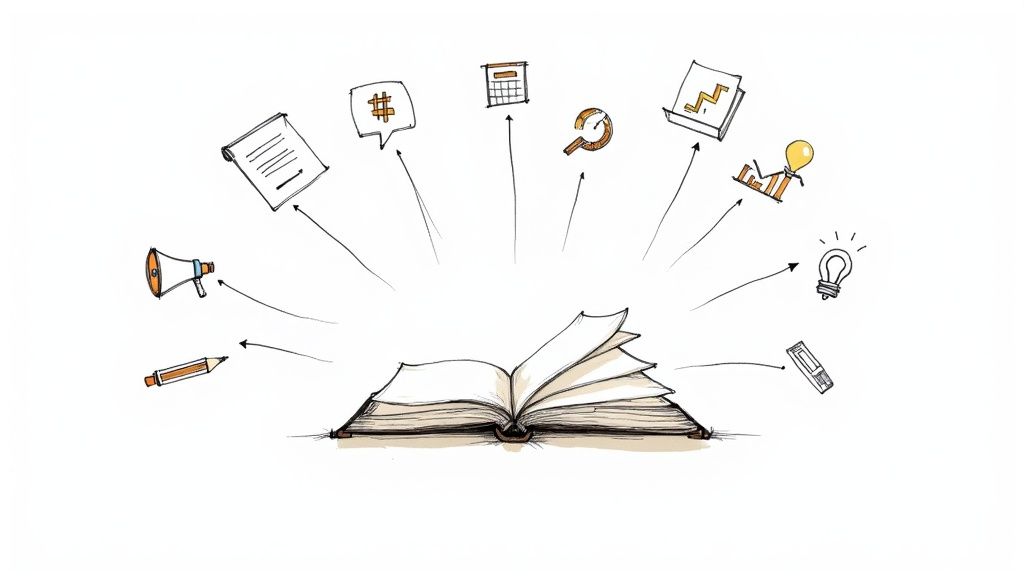7 Budget-Friendly Book Marketing Strategies: Complete Guide for Indie Authors

7 Budget-Friendly Book Marketing Strategies: Complete Guide for Indie Authors
Quick Answer
How can indie authors market books effectively on a limited budget?
Focus on high-ROI, low-cost tactics: Build an email list using free tools like Mailchimp (starter tier), optimize your Amazon/Goodreads metadata for organic discovery, engage strategically in online reader communities, and leverage social media with consistent posting schedules. Budget tiers: $0-$50/month (free tools + sweat equity), $50-$200/month (add selective paid promotions), $200-$500/month (small ad budgets + promotion sites). Expect 3-6 months to build momentum with free strategies.
Top 3 budget marketing priorities:
- Email List Building - $42 ROI for every $1 spent (highest ROI channel)
- Amazon Metadata Optimization - Free, improves organic discoverability by 30-50%
- Strategic Social Media - Free reach potential of thousands with consistent engagement
With over 4 million books published annually according to Bowker's latest report, standing out as an indie author seems impossible—especially with a limited budget. But here's the truth: effective book marketing doesn't require thousands of dollars. The most successful indie authors leverage strategic, low-cost tactics that deliver measurable results.
This guide reveals 7 proven strategies to market your book on budgets ranging from $0 to $500 monthly, complete with ROI data, free tool recommendations, and real case studies.
Budget Tier Planning: What to Expect at Each Level
Before diving into tactics, understand what's realistic at different budget levels. If you're considering professional marketing support alongside DIY efforts, our comprehensive guide to affordable book marketing services compares 11 options across various price points to help you find services that fit your budget:
$0-$50/Month: Foundation Building (Months 1-6)
Investment Breakdown:
- $0-15: Free email marketing (Mailchimp: 500 contacts)
- $15: Domain name for author website
- $0-20: Canva Pro for graphics (optional)
Expected Results:
- 50-100 email subscribers in 6 months
- 500-1,000 social media followers
- 10-30 organic sales per month
- Focus: Building foundation for future growth
$50-$200/Month: Strategic Growth (Months 6-12)
Investment Breakdown:
- $40-80: Monthly promotional sites (Freebooksy, Robin Reads)
- $50-100: Small Amazon Ads budget
- $15-20: Email marketing (MailerLite or ConvertKit)
- Optional: One-time marketing tools ($25-$60 depending on service)
Expected Results:
- 200-500 email subscribers
- 100-300 sales per month
- ROI: 150-250%
- Focus: Testing paid strategies, building momentum
$200-$500/Month: Accelerated Scaling (Months 12+)
Investment Breakdown:
- $150-300: Amazon Ads
- $50-100: Facebook/Instagram Ads testing
- $30-50: Premium email marketing tools
- $20-50: Book promotion services
Expected Results:
- 500-2,000 email subscribers
- 300-800 sales per month
- ROI: 200-350%
- Focus: Scaling what works, optimizing campaigns
1. Build and Nurture Your Email List
Email marketing delivers the highest ROI of any marketing channel—$42 for every $1 spent according to Campaign Monitor. Even better, you own your email list, unlike social media followers who can vanish with algorithm changes.
Free Email Marketing Tools
Mailchimp - Free tier
- Up to 500 subscribers
- 1,000 sends per month
- Basic automation
- Best for: Beginners testing email marketing
MailerLite - Free tier
- Up to 1,000 subscribers
- 12,000 sends per month
- Landing pages included
- Better value than Mailchimp for growing lists
Building Your List: Essential Tactics
1. Create a Reader Magnet Offer free bonus content in exchange for email signup:
- Prequel novella or deleted scenes
- Character backstories or world-building guide
- Exclusive short story
- First book in series (permafree)
Use BookFunnel (free tier available) to deliver reader magnets professionally.
2. Optimize Your Amazon Author Page
- Add "Join my Newsletter" link in author bio
- Include signup link at back of every book
- Offer newsletter-exclusive content
3. Leverage Social Media Bio Links
- Instagram/TikTok: Use Linktree or Beacons.ai (free)
- Pin newsletter signup to top of Facebook profile
- Twitter header image with signup CTA
Email Campaign Strategy
Send emails weekly or bi-weekly with this proven content mix:
40% - Behind-the-Scenes Content
- Writing process updates
- Character development insights
- Research anecdotes
30% - Exclusive Content
- Subscriber-only short stories
- Early chapter previews
- Bonus scenes
20% - Book Promotion
- New releases
- Limited-time sales
- Special editions
10% - Personal Connection
- Life updates
- Recommendations
- Reader spotlights
Target open rates of 25-35% and click rates of 3-5%. For comprehensive email strategies, see our book marketing strategies guide.

Subscribe & Get Your Free Marketing Plan Template
Receive regular updates on marketing best-practices, AI shortcuts, and get our proven 4-phase marketing roadmap for free.
Unsubscribe anytime.
2. Optimize Amazon & Goodreads Metadata
Metadata optimization costs $0 but can increase your organic discoverability by 30-50%. Most authors completely overlook this foundational strategy.
Amazon Optimization Checklist
Title & Subtitle
- Include genre/category in subtitle
- Add tropes or themes readers search for
- Example: "Dark Beginnings: A Psychological Thriller with Twists"
Seven Keyword Phrases Amazon allows 7 keyword phrases (50 characters each). Use all 350 characters:
- Include long-tail keywords: "psychological thriller books for women"
- Add author names readers compare you to
- Include tropes: "enemies to lovers romance"
Research using Publisher Rocket ($97 one-time) or free alternatives.
Categories
- Choose the two most specific categories possible
- Aim for categories where top 100 books have <5,000 sales rank
- Contact Amazon KDP support to add up to 10 total categories
Book Description
- Use HTML formatting (bold, italics, headers)
- Front-load with compelling hook in first 2 sentences
- Include genre tropes and themes
- Add social proof: awards, bestseller status, review counts
- End with clear call-to-action
For automated metadata optimization, tools and services can help generate genre-specific keywords, category recommendations, and optimized book descriptions.
Goodreads Optimization
Author Profile
- Professional photo and compelling bio
- Link to website and newsletter
- List all books with proper series order
Engagement Tactics
- Answer reader questions promptly
- Join genre-specific groups
- Run monthly giveaways (physical books)
- Host "Ask the Author" events

3. Master Strategic Social Media Marketing
Social media is free but requires consistent effort. According to Pew Research, 72% of adults use at least one platform.
Platform Selection: Where to Focus
Don't try to be everywhere. Choose 1-2 platforms where your readers congregate:
Instagram - Best for: Romance, YA, Fantasy, Thriller
- Visual storytelling with book aesthetics
- Bookstagram community is highly engaged
- Reels reach 20-30% of your followers organically
- Time investment: 30 min/day
TikTok - Best for: YA, Romance, Fantasy, New Adult
- #BookTok has 150+ billion views
- Viral potential with authentic content
- Short-form video (15-60 seconds)
- Time investment: 45 min/day
Facebook - Best for: Historical fiction, Non-fiction, Cozy mysteries
- Older demographic (35-65)
- Strong reader groups
- Facebook Ads highly targetable
- Time investment: 20 min/day
Content Strategy Framework
Post 4-6 times per week using this content mix:
30% - Book-Related Content: Cover reveals, release announcements, quotes
30% - Writing Process: Progress updates, research insights, editing challenges
20% - Community Engagement: Book recommendations, genre discussions, reader polls
20% - Personal Connection: Life updates, hobbies, behind-the-scenes
Free Tools for Social Media Management
Canva - Free tier
- Create graphics, social media posts
- Templates for every platform
- Pro tip: Use "Magic Resize" for multi-platform posts
Buffer - Free tier
- Schedule up to 10 posts
- 3 social accounts
- Basic analytics
For social media content creation, MarketMyBook ($60) automatically generates 20 compelling social media posts with images from your book's most engaging scenes—saving hours of content creation time.

4. Engage in Online Book Communities
Strategic community engagement costs $0 but delivers organic reach and credibility. The key is adding value before promoting.
High-Value Communities for Authors
Goodreads - 90+ million members
- Join 10-15 genre-specific groups
- Participate in discussions 3-4x weekly
- Offer to host group reads
- Run giveaways (requires physical books)
Reddit - Targeted subreddits
- r/books (22M members)
- r/Fantasy (2.8M members)
- r/romancebooks (300K+ members)
- r/selfpublish (80K+ members)
Reddit Tactics:
- Read subreddit rules carefully (most ban self-promotion)
- Contribute helpful comments for 2-3 weeks before mentioning your book
- Join "What are you reading?" threads naturally
Facebook Groups
- Search "[Your Genre] Book Readers"
- Join 20+ groups (participate actively in 5-10)
- Follow group rules on self-promotion
- Engage daily with comments and recommendations
Community Engagement Best Practices
The 80/20 Rule: 80% value-added participation, 20% subtle promotion
Value-Added Participation:
- Answer questions about your genre
- Recommend other authors' books
- Share writing tips and resources
- Participate in genre discussions
Warning: Spamming communities with "buy my book" posts destroys your reputation and gets you banned. Authenticity and patience are essential.
5. Leverage Author Collaboration
Collaboration multiplies your reach without multiplying costs.
Collaboration Opportunities
Newsletter Swaps - $0 cost
- Exchange newsletter mentions with similar-sized lists
- Include excerpt + buy link
- Expected reach: 100-1,000 new readers per swap
Joint Giveaways - $20-100 cost
- Bundle 5-10 author ebooks as prize
- Each author promotes to their audience
- Use platforms like ProlificWorks (free) or StoryOrigin ($20/month)
- Expected reach: 500-5,000 entries
Box Sets - $0-50 cost
- Combine novels/novellas with 5-10 authors
- Price at $0.99-$2.99 for maximum exposure
- Limited time availability (30-60 days)
- Expected results: 1,000-10,000 downloads
Finding Collaboration Partners
Where to Connect:
- 20BooksTo50K Facebook Group
- Alliance of Independent Authors
- Genre-specific author groups
Partnership Criteria:
- Similar genre/sub-genre
- Comparable audience size (within 2-3x)
- Professional book presentation
- Mutual respect and communication
6. Utilize Free Book Promotion Sites
Strategic use of free and low-cost promotion sites generates sales spikes and review momentum.
Free Promotion Sites
- Cost: $0 (if accepted)
- Requirements: 4+ star average, 10+ reviews
- Results: 1,000-3,000 downloads for free books
- Apply 4-6 weeks in advance
Freebooksy - Free submissions
- Results: 100-500 downloads
- No approval required
- Best for: Building visibility on free days
BargainBooksy - Free submissions
- For $0.99-$2.99 promotions
- Results: 50-200 sales
- Good supplementary promotion
Low-Cost Promotion Sites ($40-$80)
Freebooksy Paid - $40-80
- Better placement than free submission
- Results: 500-1,500 downloads (free) or 200-500 sales ($0.99)
Robin Reads - $20-60
- Growing platform
- Good value for money
- Results: 200-800 downloads/sales
Promotion Stacking Strategy
Don't run promotions in isolation. Stack tactics:
Example Launch Week Stack:
- Day 1-2: Amazon Countdown Deal (99¢)
- Day 1: Freebooksy paid promotion
- Day 2: Newsletter blast to list
- Days 1-7: Amazon Ads at increased budget
- Days 1-7: Social media promotion campaign
Expected Results: 300-1,000 sales, 20-50 new reviews, improved Amazon ranking

7. Build Your Author Platform with Free Tools
Your author website and platform serve as your central marketing hub.
Build a Professional Author Website
Free/Low-Cost Options:
- Wix - Free tier with Wix branding
- WordPress.com - Free tier, limited customization
- Carrd - $9/year for 3 sites, simple and clean
Essential Pages:
- Home: Clear headline about your genre, latest book, newsletter signup
- Books: All titles with covers, descriptions, buy links
- About: Author bio, photo, fun facts
- Blog/News: Regular updates (SEO benefit)
- Contact: Email, social media links
Technical SEO Basics (free):
- Install Google Analytics
- Submit sitemap to Google Search Console
- Use descriptive page titles and meta descriptions
- Optimize images (compress, add alt text)
For authors looking to create consistent blog content, ManuscriptReport's Blog Series ($35) generates 6-10 SEO-optimized blog posts in your authentic voice from your manuscript—perfect for building topical authority.
Real Case Study: $200 Budget Success Story
Jessica Turner - Debut contemporary romance author
Starting Position:
- Debut novel, zero platform
- 87 email subscribers (friends/family)
- $200 total marketing budget
- 3 months pre-launch preparation
Budget Allocation:
- $49: ManuscriptReport for marketing foundation
- $40: Freebooksy promotion (launch week)
- $30: Robin Reads promotion (week 2)
- $35: ARC copies via NetGalley
- $46: Conservative Amazon Ads (weeks 1-4)
Pre-Launch (90 days):
- Built email list via reader magnet (prequel novella)
- Posted consistently on Instagram (romance aesthetic)
- Joined 15 romance reader Facebook groups
- Gathered 25 ARC reviews
Launch Week Strategy:
- Priced at $0.99 for first 7 days
- Freebooksy promotion Day 1
- Newsletter blast + personal reach-out
- $10/day Amazon Ads
Results:
- Week 1: 487 sales at $0.99
- Week 2: 156 sales at $2.99
- Weeks 3-4: 89 sales at $2.99
- Total first month: 732 sales
- Revenue: $1,678
- ROI: 739%
Long-Term Impact:
- Email list grew to 425 subscribers
- Ongoing organic sales: 40-60/month
- Strong foundation for Book 2 launch
Free Tools Master List
Email Marketing:
- Mailchimp - 500 contacts free
- MailerLite - 1,000 contacts free
Social Media Management:
Website & Landing Pages:
Reader Magnets & ARCs:
- BookFunnel - Free tier available
- StoryOrigin - $20/month
Analytics:
- Google Analytics - Free
- Google Search Console - Free
For comprehensive marketing support that typically costs $2,000+ from consultants, ManuscriptReport's affordable book marketing services start at just $25 (Book Bible for series tracking).
Frequently Asked Questions
How can I market my book with zero budget?
Market effectively with $0 by focusing on: 1) Optimize Amazon/Goodreads metadata (keywords, categories, description), 2) Build email list using free tools like Mailchimp (500 contacts free), 3) Engage strategically in online communities (Goodreads groups, Reddit, Facebook groups), 4) Post consistently on 1-2 social media platforms, 5) Collaborate with other authors for newsletter swaps and joint giveaways, 6) Submit to free promotion sites like Freebooksy. Expect 3-6 months to build momentum.
What's the minimum budget needed for effective book marketing?
$50-$200/month is the sweet spot for budget-conscious indie authors seeing measurable results. Allocate: $40-80 for monthly promotion sites (Freebooksy, Robin Reads), $50-100 for small Amazon Ads budget, $15-20 for email marketing beyond free tier, plus optional one-time investment in marketing tools ($25-$60 depending on service). At this level, expect 100-300 sales/month with 150-250% ROI after 3-6 months of consistent effort.
Which free marketing strategy delivers the best ROI?
Email marketing delivers the highest ROI at $42 for every $1 spent, even on free tiers. Build your list through reader magnets, back-of-book CTAs, social media bio links, and Goodreads giveaways. Send weekly or bi-weekly newsletters with 40% behind-the-scenes, 30% exclusive content, 20% book promotion, 10% personal connection. Target 25-35% open rates. Unlike social media followers, you own your email list permanently.
How long does budget marketing take to show results?
Expect 3-6 months to build meaningful momentum with free/low-budget strategies. Timeline: Months 1-2 focus on foundation, Months 3-4 see initial traction (50-100 email subscribers, 10-30 organic sales/month), Months 6+ show compounding results (200+ subscribers, 100+ sales/month). Paid promotions show faster results but require ongoing investment.
Should I focus on social media followers or email subscribers?
Prioritize email subscribers over social media followers. Email delivers 40x higher conversion rates and provides direct, owned access to your audience. Social media: algorithm-dependent, declining organic reach (2-3%). Email: you own the list, 25-35% open rates, highest ROI ($42 per $1 spent). Use social media to drive email signups, not as your primary audience-building tool.
What budget marketing mistakes should I avoid?
Top mistakes: 1) Spreading budget too thin (focus on 2-3 tactics executed exceptionally), 2) Inconsistent effort (sporadic posting kills momentum), 3) Ignoring email list building, 4) Poor book packaging (amateur cover/blurb), 5) Expecting overnight results (commit to 6-12 months), 6) Not tracking results, 7) Starting paid ads before optimizing metadata and building email list foundation.
Can I succeed with book marketing on a $100/month budget?
Yes, $100/month can generate meaningful results when strategically allocated. Recommended split: $40-50 for one quality promotion site (Freebooksy/Robin Reads), $50-60 for small Amazon Ads testing or email marketing tool upgrade. Supplement with free tactics: metadata optimization, social media, community engagement, author collaboration. Optional one-time investments in marketing tools ($25-$60) can amplify results. Expect 100-200 sales/month after 3-4 months of consistent effort, with 150-250% ROI. Reinvest profits to gradually increase budget.
Your Budget Marketing Action Plan
You don't need thousands of dollars to market your book effectively. You need strategy, consistency, and smart resource allocation.
Start Today:
- Optimize your Amazon metadata (30 minutes, $0)
- Set up a free email marketing account (15 minutes, $0)
- Join 5 relevant online communities (30 minutes, $0)
- Create a content calendar for your chosen social platform (45 minutes, $0)
This Week: 5. Create a reader magnet and set up delivery (2-3 hours, $0-15) 6. Reach out to 3 authors for collaboration (30 minutes, $0) 7. Submit to 3 free promotion sites (45 minutes, $0)
This Month: 8. Build your email list to 25+ subscribers 9. Post consistently on social media (4-6x weekly) 10. Launch your first strategic promotion
Stop waiting for the "perfect" marketing budget. Start with what you have today.
Your readers are out there. These strategies will help them find you.
Enjoyed this article? Subscribe for more + get a free marketing roadmap template.
Receive regular updates on marketing best-practices, AI shortcuts, and get our proven 4-phase marketing roadmap template for free.
Unsubscribe anytime.
Related Articles

6 Essential Book Marketing Strategies for Romance Novels
Discover 6 proven strategies to market your romance novel effectively and boost sales.

The Ultimate Affordable Book Launch Checklist: 9 Essential Steps for 2026
Complete affordable book launch checklist for 2026. Follow 9 proven steps—from budget planning to post-launch—for indie and self-published authors. Launch successfully for under $500.

12 Proven Book Marketing Strategies for Authors: Complete Guide 2026
Master 12 proven book marketing strategies to sell more books in 2026. From metadata optimization to paid ads, get actionable tactics that drive real results.